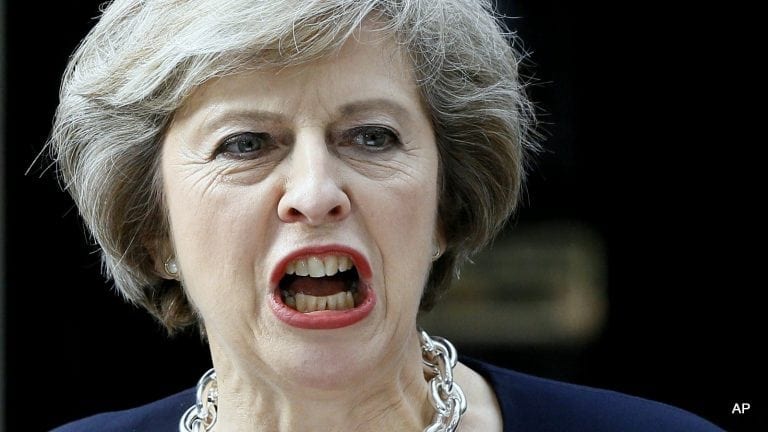:: Analysis

Of late British Prime Minister Theresa May has been the most visible cog in a reckless and gigantic machine of Western disinformation leading the world to a probable nuclear war. Why don't ordinary citizens rise against such sociopathic madness?
A number of fundamental questions arise regarding the origins and growing intensity of this anti-Russian animus.
Why do the Western regimes now feel Russia is a greater threat than in the past? Do they believe Russia is more vulnerable to Western threats or attacks? Why do the Western military leaders seek to undermine Russia’s defenses? Do the US economic elites believe it is possible to provoke an economic crisis and the demise of President Putin’s government? What is the strategic goal of Western policymakers? Why has the UK regime taken the lead in the anti-Russian crusade via the fake toxin accusations at this time?
This paper is directed at providing key elements to address these questions.
The Historical Context for Western Aggression
Several fundamental historical factors dating back to the 1990’s account for the current surge in Western hostility to Russia.
First and foremost, during the 1990’s the US degraded Russia, reducing it to a vassal state, and imposing itself as a unipolar state.
Secondly, Western elites pillaged the Russian economy, seizing and laundering hundreds of billions of dollars. Wall Street and City of London banks and overseas tax havens were the main beneficiaries
Thirdly, the US seized and took control of the Russian electoral process, and secured the fraudulent “election” of Yeltsin.
Fourthly, the West degraded Russia’s military and scientific institutions and advanced their armed forces to Russia’s borders.
Fifthly, the West insured that Russia was unable to support its allies and independent governments throughout Europe, Asia, Africa and Latin America. Russia was unable to aid its allies in the Ukraine, Cuba, North Korea, Libya etc.
With the collapse of the Yeltsin regime and the election of President Putin, Russia regained its sovereignty, its economy recovered, its armed forces and scientific institutes were rebuilt and strengthened. Poverty was sharply reduced and Western backed gangster capitalists were constrained, jailed or fled mostly to the UK and the US.
Russia’s historic recovery under President Putin and its gradual international influence shattered the US pretense to rule over a unipolar world. Russia’s recovery and control of its economic resources lessened US dominance, especially of its oil and gas fields.
As Russia consolidated its sovereignty and advanced economically, socially, politically and militarily, the West increased its hostility in an effort to roll-back Russia to the Dark Ages of the 1990’s.
The US launched numerous coups and military intervention and fraudulent elections to surround and isolate Russia . The Ukraine, Iraq, Syria, Libya, Yemen and Russian allies in Central Asia were targeted. NATO military bases proliferated.
Russia’s economy was targeted : sanctions were directed at its imports and exports. President Putin was subject to a virulent Western media propaganda campaign (which naturally has not abated). US NGO’s funded opposition parties and politicians.
The US-EU rollback campaign failed.
The encirclement campaign failed.
The Ukraine fragmented - Russia allies took control of the East; Crimeans voted for unification with Russia. Syria joined with Russia to defeat armed US vassals. Russia turned to China’s multi-lateral trade, transport and financial networks.
As the entire US unipolar fantasy dissolved it provoked deep resentment, animosity and a systematic counter-attack. The US’s costly and failed war on terror became a dress rehearsal for the economic and ideological war against the Kremlin ...Russia’s historical recovery and defeat of Western rollback intensified the ideological and economic war.
The UK poison plot was concocted to heighten economic tensions and prepare the western public for heightened military confrontations.
Russia is not a threat to the West: it is recovering its sovereignty in order to further a multi-polar world. President Putin is not an “aggressor” but he refuses to allow Russia to return to vassalage.
President Putin is immensely popular in Russia and hated by the US precisely because he is the opposition of Yeltsin - he has created a flourishing economy; he resists sanctions and defends Russia’s borders and allies.
Conclusion
In a summary response to the opening questions.
1) The Western regimes recognize that Russia is a threat to their global dominance; they know that Russia is no threat to invade the EU, North America or their vassals.
2) Western regimes believe they can topple Russia via economic warfare including sanctions. In fact Russia has become more self-reliant and has diversified its trading partners, especially China, and even includes Saudi Arabia and other Western allies.
The Western propaganda campaign has failed to turn Russian voters against Putin. In the March 19, 2018 Presidential election voter participation increased to 67% ..Vladimir Putin secured a record 77% majority. President Putin is politically stronger than ever.
Russia’s display of advanced nuclear and other advanced weaponry has had a major deterrent effect especially among US military leaders, making it clear that Russia is not vulnerable to attack.
The UK has attempted to unify and gain importance with the EU and the US via the launch of its anti-Russia toxic conspiracy. Prime Minister May has failed. Brexit will force the UK to break with the EU.
President Trump will not replace the EU as a substitute trading partner. While the EU and Washington may back the UK crusade against Russia they will pursue their own trade agenda; which do not include the UK.
In a word, the UK, the EU and the US are ganging-up on Russia, for diverse historic and contemporary reasons. The UK exploitation of the anti-Russian conspiracy is a temporary ploy to join the gang but will not change its inevitable global decline and the break-up of the UK.
Russia will remain a global power. It will continue under the leadership of President Putin .The Western powers will divide and bugger their neighbors - and decide it is their better judgment to accept and work within a multi-polar world.
First iteration 03.20.2018
 James Petras is a world-renowned public intellectual. He is a retired Bartle Professor of Sociology at Binghamton University in Binghamton, New York and adjunct professor at Saint Mary's University, Halifax, Nova Scotia, Canada who has published extensively on Latin American and Middle Eastern political issues.
James Petras is a world-renowned public intellectual. He is a retired Bartle Professor of Sociology at Binghamton University in Binghamton, New York and adjunct professor at Saint Mary's University, Halifax, Nova Scotia, Canada who has published extensively on Latin American and Middle Eastern political issues.



